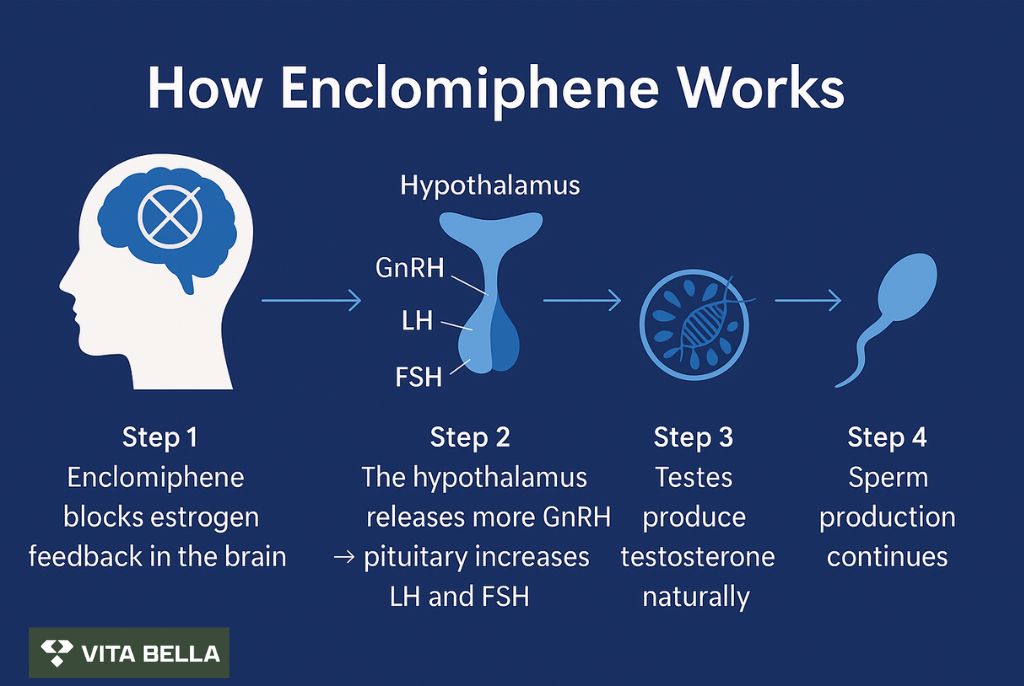What if the key to feeling stronger, sharper, and more alive wasn’t more testosterone but a more innovative way to restore it? Low testosterone (hypogonadism) can affect energy, fertility, and overall health. Unlike testosterone replacement therapy (TRT), which may suppress sperm production, enclomiphene citrate 1 offers a fertility-friendly alternative. This oral medication boosts the body’s natural testosterone production by stimulating internal hormone pathways.
Feel stronger, focused, and in control again. Vita Bella’s enclomiphene-based approach supports your body’s natural testosterone production while maintaining fertility. Backed by clinical research, this therapy helps restore energy, confidence, and hormonal balance from within. It’s time to rediscover your power, naturally, with Vita Bella.
What is the Mechanism of Action of Enclomiphene?
Enclomiphene is the trans-isomer of clomiphene citrate and functions as a selective estrogen receptor modulator (SERM). It works by blocking estrogen receptors in the hypothalamus and pituitary, thereby reducing estrogen’s negative feedback and triggering the release of luteinizing hormone (LH) and follicle-stimulating hormone (FSH).
This hormonal rise stimulates the testes to produce testosterone naturally without halting spermatogenesis. Human studies confirm that enclomiphene increases testosterone levels while maintaining sperm counts, a key advantage over TRT.

What do Studies Show about Enclomiphene?
In a double-blind, placebo-controlled trial 2, enclomiphene significantly increased testosterone and LH within weeks of therapy, restoring men with secondary hypogonadism to the normal testosterone range. Importantly, sperm concentration and motility were maintained throughout treatment, unlike with exogenous testosterone.
Is there any difference between Enclomiphene and Clomiphene?
Both drugs work through the same hormonal pathway, enclomiphene offers a more precise pharmacologic profile. Clomiphene 3 is a mixture of two isomers, enclomiphene (trans) and zuclomiphene (cis). Zuclomiphene has a long half-life and acts as a weak estrogen agonist, potentially causing mood swings, gynecomastia, or fatigue. Enclomiphene, being free of this isomer, delivers faster clearance and fewer estrogen-related side effects while maintaining similar testosterone gains.
What is the ideal dosage and way of Administration of Enclomiphene?
Most human studies 4 use 12.5 mg to 25 mg daily as the optimal dose range for enclomiphene. Lower doses (12.5 mg) effectively restore testosterone in men with mild-to-moderate hypogonadism, while 25 mg daily may be used in more severe cases.
In clinical practice, endocrinologists typically start with a low dose and titrate based on the hormone response and symptoms. In trials, enclomiphene normalized testosterone levels in 80–90% of men within 2–3 months of use, while maintaining gonadotropin and sperm parameters.
What to Expect with Treatment of Enclomiphene?
In clinical follow-ups 5, enclomiphene maintained eugonadal testosterone while preserving sperm motility, showing both efficacy and safety for ongoing use. Enclomiphene acts gradually, with most users experiencing hormonal improvement before physical changes.
2–4 weeks: Increases in LH and FSH, followed by a rise in testosterone.
3 months: Noticeable improvement in energy, libido, and mood.
6 months: Stabilization of testosterone levels and sustained fertility.
What is the Safety and Tolerability of Enclomiphene?
Human studies 2 consistently describe enclomiphene as well-tolerated. In a comparative cohort of 66 men who switched from clomiphene to enclomiphene, the latter group reported significantly fewer adverse events, including reduced libido, fatigue, and mood changes. Estradiol elevation was also lower (–5.92 pg/mL vs +17.50 pg/mL, P = 0.001). No serious adverse events were reported, and no suppression of spermatogenesis occurred. This makes enclomiphene a safe, fertility-preserving alternative for long-term hormone management.
What are the Advantages of Enclomiphene Over Testosterone Therapy?
Unlike TRT, which shuts down the body’s own testosterone production and often leads to infertility, enclomiphene enhances natural production through hormonal feedback control.
Key advantages include:
Preserves and may improve sperm count and motility.
Maintains LH and FSH activity, supporting natural fertility.
Reduces estrogen-related side effects common in clomiphene users.
Oral, cost-effective, and non-invasive.
In a 6-month follow-up 4, enclomiphene-treated men sustained normal testosterone without significant changes in hematocrit or lipid profiles, indicating systemic safety.
What are the Monitoring and Follow-Up Criteria?
Men should report any visual changes, headaches, or mood shifts, though such events are rare and typically reversible. To ensure safe and effective treatment, clinicians recommend:
Regular hormone testing every 3–6 months (total and free testosterone, LH, FSH, estradiol).
Semen analysis to track fertility outcomes.
Liver and hematocrit monitoring during prolonged therapy.
Act Now, Restore Balance, Reignite Strength, and Redefine Your Best Self
Fatigue, low libido, and mood swings are more than just symptoms; they’re signs your hormones need support. Vita Bella offers a modern, research-backed solution with enclomiphene to help men safely and naturally restore their energy, masculinity, and motivation. Backed by clinical science, this therapy works in harmony with your body’s rhythm to restore balance and confidence. It’s time to take control of your hormone health and feel like yourself again with Vita Bella.
FAQs
How does enclomiphene differ from traditional testosterone therapy?
Unlike testosterone replacement therapy (TRT), which adds external testosterone and can suppress sperm production, enclomiphene stimulates your body’s own natural testosterone production. It works by boosting LH and FSH levels, helping maintain fertility while restoring healthy hormone balance.
How long does it take to notice results with enclomiphene?
Most men experience hormonal improvements within 3 to 4 weeks, including increased energy and focus. Noticeable physical and mood improvements typically appear after 2 to 3 months of consistent use as testosterone levels stabilize.
Is enclomiphene safe for long-term use?
Yes, human studies have shown that enclomiphene is well-tolerated, with minimal side effects compared to other therapies. When monitored regularly by a healthcare professional, it can be safely used for extended periods without suppressing fertility or causing hormonal crashes.
What kind of monitoring is needed during treatment?
Doctors usually recommend checking testosterone, LH, FSH, estradiol, hematocrit, and sometimes liver function every 3 to 6 months. Periodic semen analyses can also confirm that fertility is maintained while hormone levels remain balanced.
References:
Wiehle, R. D., Fontenot, G. K., Wike, J., Hsu, K., Nydell, J., Lipshultz, L., & the ZA-203 Clinical Study Group. (2014). Enclomiphene citrate stimulates testosterone production while preventing oligospermia: A randomized phase II clinical trial comparing topical testosterone. Fertility and Sterility, 102(3), 720–727. https://doi.org/10.1016/j.fertnstert.2014.06.004
Saffati, G., Kassab, J., Orozco Rendon, D., Hinojosa-Gonzalez, D. E., Kronstedt, S., Lipshultz, L. I., & Khera, M. (2024). Safety and efficacy of enclomiphene and clomiphene for hypogonadal men. Translational Andrology and Urology. https://doi.org/10.21037/tau-24-238
Kassab, J., Saffati, G., Lipshultz, L., & Khera, M. (2024). (094) Safety and Efficacy of Enclomiphene Compared to Clomiphene for Hypogonadal Men. The Journal of Sexual Medicine, 21(Supplement 1), qdae001.090. https://doi.org/10.1093/jsxmed/qdae001.090
Wiehle, R., Cunningham, G. R., Pitteloud, N., Wike, J., Hsu, K., Fontenot, G. K., Rosner, M., Dwyer, A., & Podolski, J. (2013). Testosterone restoration using enclomiphene citrate in men with secondary hypogonadism: A pharmacodynamic and pharmacokinetic study. BJU International, 112(8), 1188–1200. https://doi.org/10.1111/bju.12363
Thomas, J., Suarez Arbelaez, M. C., Narasimman, M., Weber, A. R., Blachman-Braun, R., White, J. T., Ledesma, B., Ghomeshi, A., Jara-Palacios, M. A., & Ramasamy, R. (2023). Efficacy of clomiphene citrate versus enclomiphene citrate for male infertility treatment: A retrospective study. Cureus, 15(7), e41476. https://doi.org/10.7759/cureus.41476





















